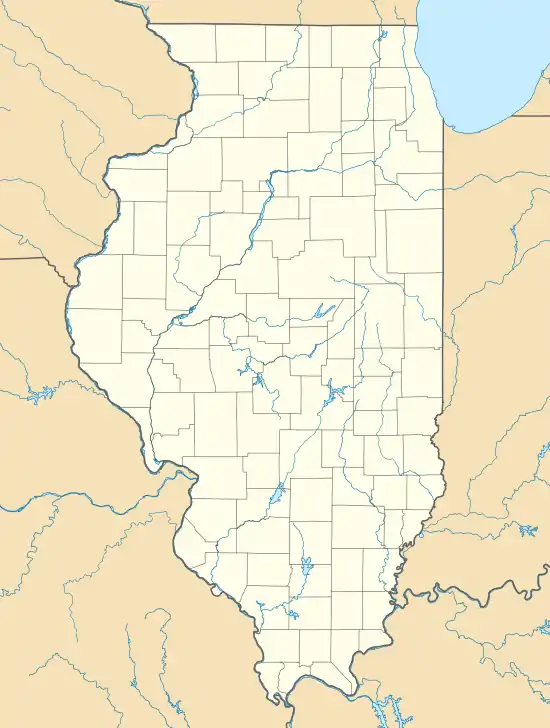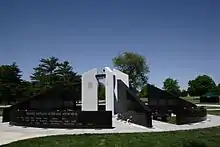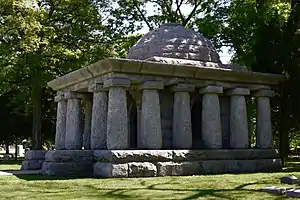Oak Ridge Cemetery
Oak Ridge Cemetery is a cemetery located in Springfield, Illinois, in the United States.
Oak Ridge Cemetery | |
 Abraham Lincoln's tomb at Oak Ridge Cemetery. | |
  | |
| Location | 1441 Monument Ave., Springfield, Illinois |
|---|---|
| Coordinates | 39°49′25″N 89°39′28″W |
| Area | 365 acres (148 ha) |
| Built | 1855 |
| Architect | Saunders, William |
| Architectural style | Classical Revival, Romanesque |
| NRHP reference No. | 95000986 [1] |
| Added to NRHP | August 4, 1995 |
The Lincoln Tomb, which serves as the final resting place of Abraham Lincoln, his wife and all but one of his children, is located at Oak Ridge. A number of other prominent politicians and persons from Illinois are also buried at the cemetery.
As a result of Lincoln's Tomb, Oak Ridge is the second-most visited cemetery in the United States, after Arlington National Cemetery.[2]
Oak Ridge is the third and now only public cemetery in Springfield; the other two cemeteries were the City Cemetery and Hutchinson.[3] Oak Ridge was established in 1860[4] and designed by William Saunders as part of the Rural Cemetery Landscape Lawn Style.[3] The location of the cemetery was carefully selected because of the topography, which included rolling hills which was key in the Rural Cemetery Landscape Lawn Style. The many oak trees in the cemetery is how Oak Ridge got its name. The ridge borders low-lying Spring Creek, creating landscaped topography unusual in central Illinois.
The newest section, in the southwest, of Oak Ridge opened after 1945. The design follows the Memorial Park style cemetery in which roadways are wider to accommodate vehicles.[3]
The Cemetery has memorials for the Korean War and World War II, and the Illinois Vietnam Veterans Memorial. A museum of Central Illinois African-American history is located adjacent to the cemetery.
Notable burials
- William Henry Bissell
- Jacob Bunn
- John Whitfield Bunn
- Daniel Pope Cook
- John Cook
- Shelby Moore Cullom
- Jesse K. Dubois
- Ninian Edwards
- William Lee D. Ewing
- Nellie Grant – daughter of President Ulysses S. Grant
- William Herndon
- Elijah Iles
- William Jayne
- John L. Lewis - President of the United Mine Workers from 1919 to 1960
- Abraham Lincoln – sixteenth President of the United States during the Civil War
- Mary Todd Lincoln – Abraham's wife
- Fleetwood Lindley – the last person to have looked upon Lincoln's face in September 1901
- Vachel Lindsay
- John Alexander McClernand
- Alfred Orendorff
- John Carroll Power – first custodian of Lincoln's Tomb
- Alexander Starne – Illinois Secretary of State and Illinois Treasurer
- John T. Stuart – U.S. Congressman, lawyer, law partner of Abraham Lincoln
- John Riley Tanner
- Arthur Harrison Wilson (Medal of Honor)
Gallery
 Korean War Memorial
Korean War Memorial Close up of Korean War Memorial
Close up of Korean War Memorial Battle of Chosin Reservoir Memorial
Battle of Chosin Reservoir Memorial Illinois Vietnam Veterans Memorial
Illinois Vietnam Veterans Memorial Vietnam War Memorial close up
Vietnam War Memorial close up World War II Memorial
World War II Memorial The European Theater side of the World War II Memorial
The European Theater side of the World War II Memorial Lincoln's Tomb
Lincoln's Tomb
Burial room Lincoln's Tomb
Lincoln's Tomb
Custodian's Residence Governor John Riley Tanner's tomb
Governor John Riley Tanner's tomb
References
- "National Register Information System". National Register of Historic Places. National Park Service. March 13, 2009.
- www.graveyards.com
- National Register of Historic Places
- Russo, Edward J. (2009). Oak Ridge Cemetery. Charleston, South Carolina: Arcadia Publishing. p. 51. ISBN 978-0-7385-7723-4. Retrieved 8 August 2019.
External links
| Wikimedia Commons has media related to Oak Ridge Cemetery (Springfield, Illinois). |
- Illinois Ancestors - Oak Ridge Cemetery
- Oak Ridge Cemetery - City of Springfield
- Graveyards.com - photos
- Find a Grave - Oak Ridge Cemetery